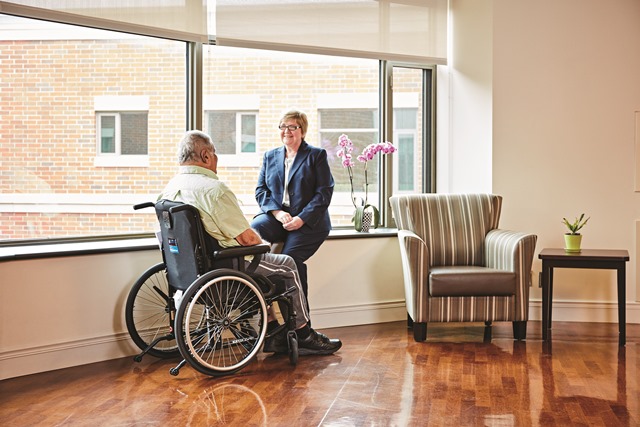
By Carla Wintersgill
For some patients, undertaking a stay at a hospital can be an overwhelming experience. Often, patients are unsure where to turn to express their comments or concerns about their care.
With its new patient and family engagement committees, Runnymede Healthcare Centre is enhancing the patient experience by providing a forum for patients and families to actively engage in their healthcare by voicing their feedback.
In continued support of Runnymede’s commitment to putting patients first, the floor-based committees are designed to augment the quality of care the hospital provides. These committees are a forum for patients, families, and management to initiate quality and safety improvement discussions with a shared goal of making floor-based enhancements in a timely manner.
“Everything goes back to putting patients at the centre of their care,” says Victoria Forrest, Patient Care Coordinator. “We want to make sure they are included in everything.”
Held monthly, each meeting begins with a review of the previous meeting’s minutes and a discussion of how the concerns have been met. Agenda items are set with input from patients, families, and clinical staff.
Attendance for the meetings has been growing steadily since their introduction in May 2017. The patient care manager chairs the meetings, which are also attended by the patient care coordinator, social worker, clinical educator, and advance practice nurses. Families are invited to participate because they often speak on behalf of patients.
The committees provide the benefit of fostering two-way communication and collaboration between the hospital and patients. Patients are able to share the issues they would like addressed, while the hospital keeps patients informed about ongoing improvements and can solicit feedback on resources and policies.
“The patient and family engagement committees provide a mechanism for patients and families to gain a better understanding of patient care delivery,” says Runnymede’s Vice President of Strategy, Quality and Clinical Programs, Sharleen Ahmed. “They also provide a structured vehicle to communicate quality and safety issues and improvement strategies for the hospital.”
Many patient suggestions are quickly implemented once they are brought to the hospital’s attention.
After family members expressed confusion about a staffing procedure, the nursing education manager was brought into the following meeting to explain the process.
One patient didn’t know where to turn with his request to have ice cream for dessert. After he put it forward at a meeting, the patient care coordinator spoke with the dietician, who signed off on ice cream for the patient.
Other small improvements have enhanced the patient experience for an entire floor, such as replacing the old coffee mugs.
The patient and family engagement committees are one more way Runnymede places patients at the centre of their own care and decision-making.
“Before these committees, patients didn’t know where to go with these concerns,” says Forrest. “Now they have a voice.”
Carla Wintersgill is a Communications Specialist at Runnymede Healthcare Centre.

